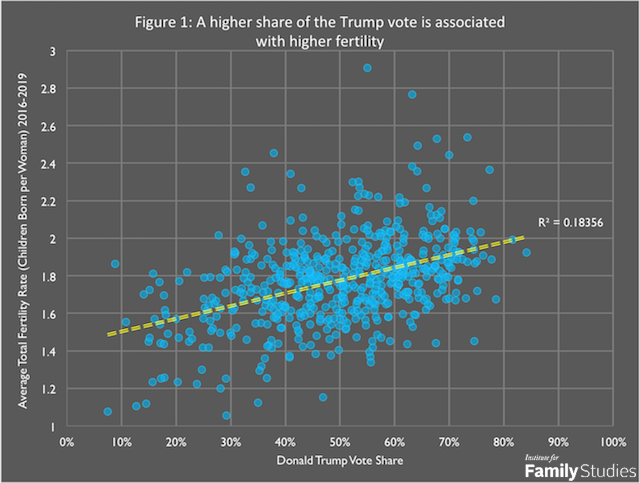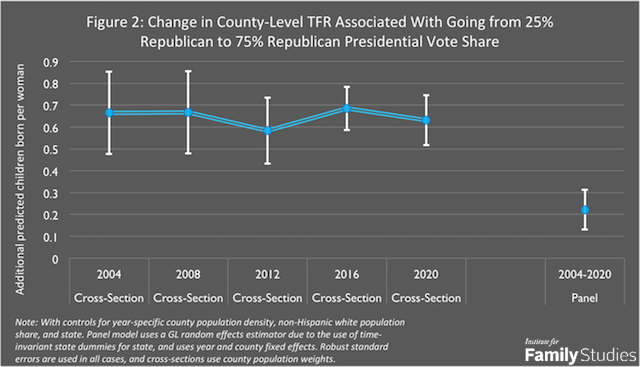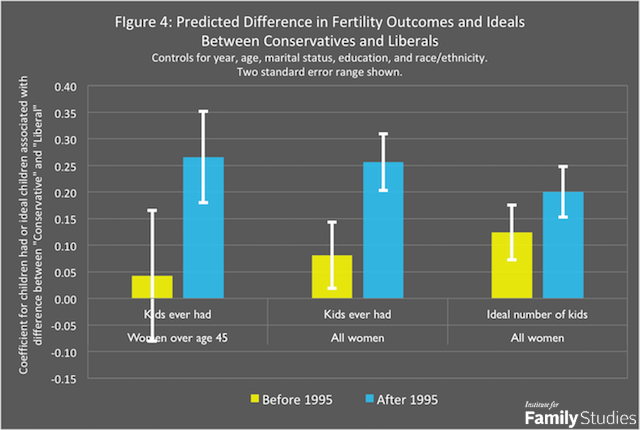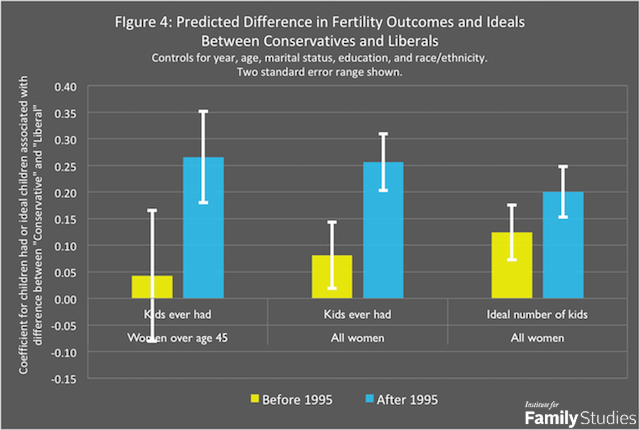I have a new article out today at @FamStudies asking the question: how much are our political differences really differences in FAMILY LIFE? https://ifstudies.org/blog/the-conservative-fertility-advantage
For the graphs I focused on fertility. But I could have done marriage rates and gotten more-or-less the same results.
The question for the post arises from this graph. Counties with higher Republican presidential vote shares have MUCH higher birth rates.
Why?
Why?
That chart shows about 600 counties, that is, all counties large enough to allow their vital statistics to be measured using CDC's public-use vital statistics tools. But crucially, it EXCLUDES the vast majority of small counties, which tend to be highly rural...
Rural counties, in turn, tend to be very Republican AND higher-TFR.
So I'm almost certainly understating the relationship.
If I restrict to just the highest density counties, the relationship is the same too.
So I'm almost certainly understating the relationship.
If I restrict to just the highest density counties, the relationship is the same too.
But to get more precisely, I went ahead and collected county-level data on 1) population density, 2) non-Hispanic white population share, 3) GOP presidential vote share, 4) TFR for all counties with data from 2004-2020; alas couldn't easily get county fertility earlier.
I wanted to know: is this Republican fertility advantage SIMPLY caused by density? Is it just that the GOP wins farms and exurbs where families like to live? Is it due to differences in the racial mix of the vote? Is it a stable relationship or new to Trump?
What I find is that the GOP fertility advantage:
1) Is stable from 2004-2020
2) Exists in time-series, not just cross-section
3) Exists even with controls for race, population density, and state in which a county is located
1) Is stable from 2004-2020
2) Exists in time-series, not just cross-section
3) Exists even with controls for race, population density, and state in which a county is located
That is to say, if we compare counties with similar racial makeups and population densities in the same state, the more-Republican-leaning county will tend to have more births compared to the number of childbearing-age women.
The effect is pretty big. A shift from 25% Trump to 75% Trump, a difference we observe within the cross-sectional data quite routinely, is associated with about 0.6 more children per woman on average.
That gap is ENORMOUS.
That gap is ENORMOUS.
That's similar to the gap in fertility between e.g. non-Hispanic whites and Hispanics. That's about the size of the fertility difference between the US and South Korea on one end, or the US and Saudi Arabia on the other end.
Now, in the panel model which identifies the association in change over time, the effect size shrinks a lot. But it's still quite significant. This suggests that as counties get more Republican, they also tend to see rising fertility rates (or vice versa).
That may not be causal, or the causality could run either way.
But if we look at individual-level data from the General Social Survey, there's reason to think there really is a causal relationship here.
But if we look at individual-level data from the General Social Survey, there's reason to think there really is a causal relationship here.
Here I show the difference in children ever born or ideal family size associated with a woman self-identifying as "liberal" or "conservative." I'm controlling for race/ethnic, education, age, of survey, and marital status.
Conservatives have more babies.
Conservatives have more babies.
Before 1995, the gap was pretty small. Liberal women who turned 45 before the 1990s and their conservative peers had about the same fertility rates. But for women turning 45 after the 1990s (i.e. women having babies in the 1980s and beyond), a BIG gap shows up.
The gap is smaller than what we observe in the cross-sectional election data, but is similar to what we observe in the panel data, reinforcing the idea that we are measuring a plausible effect. I think this effect size or the panel effect size is a good rule-of-thumb estimate.
If we relax the "over 45" assumption and instead look at children ever born at any age, so we include women whose fertility isn't finished yet, we see the gap is pretty similar. So there's a timing AND cohort effect here.
Notably, conservative women already had more kids before the 1990s if we allow timing effects to matter, suggesting that "fertility delay" is associated with more liberal political identification.
But again, causality is tricky. It could be that having kids makes people become more conservative!
And by the way, THIS IS WHAT HAPPENS. This paper finds that having children nudges women towards more socially conservative views: https://www.nber.org/papers/w24740
And by the way, THIS IS WHAT HAPPENS. This paper finds that having children nudges women towards more socially conservative views: https://www.nber.org/papers/w24740
But.... that is not ALL that happens.
Note that third pair: fertility IDEALS. We can see that it's not just that conservative women HAVE more kids. They WANT more kids.
Note that third pair: fertility IDEALS. We can see that it's not just that conservative women HAVE more kids. They WANT more kids.
This difference in ideals is not trivial.
It turns out, the negative association between liberalism and childbearing ideals exists regardless of how I control. But most notably, if I limit to "childless women under 30," liberalism STILL HAS A SIGNIFICANT NEGATIVE ASSOCIATION.
It turns out, the negative association between liberalism and childbearing ideals exists regardless of how I control. But most notably, if I limit to "childless women under 30," liberalism STILL HAS A SIGNIFICANT NEGATIVE ASSOCIATION.
This is important because while not totally definitive, it suggests that the higher conservative fertility desires probably *precede* actual childbearing; i.e. these desires aren't JUST post-hoc rationalizations of fertility, but in fact predictors of it.
So it appears that while certainly Having Kids-->Becoming More Conservative is one thing that happens, Being More Conservative-->Desiring More Kids is also a thing. And mountains of prior research shows Desiring More Kids-->Having More Kids is very real.
But maybe that's not all that's going on.
CONDITIONAL ON FERTILITY PREFERENCES, do conservatives have more babies? i.e. do women of similar fertility preferences but different political ideologies have different numbers of kids?
The answer is.... meh, maybe?
CONDITIONAL ON FERTILITY PREFERENCES, do conservatives have more babies? i.e. do women of similar fertility preferences but different political ideologies have different numbers of kids?
The answer is.... meh, maybe?
When a control for fertility ideals is thrown in, the coefficient for ideology remains negative for liberals-- but it shrinks, and it becomes statistically insignificant.
Broadly speaking, this suggests that it's probably more likely that the effect goes Conservatism-->Ideals-->Fertility, than Conservatism-->Determination to Achieve Ideals-->Fertility
However.... if we flip that, i.e. if we predict ideals with a control for childbearing history, it turns out that the coefficient remains significant (if smallish). i.e. conditional on having a certain number of kids, conservative women *desire more* kids
This could suggest that conservative women experience more positive flexibility, i.e. that after having a child conservative women are more likely to revise their ideals upwards.

 Read on Twitter
Read on Twitter





